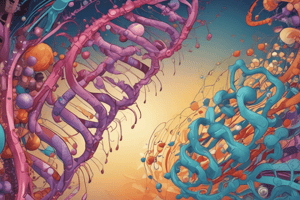Podcast
Questions and Answers
What is the primary function of transcription in protein synthesis?
What is the primary function of transcription in protein synthesis?
- To translate the mRNA into a protein
- To assemble amino acids in the desired sequence
- To copy the genetic information stored in DNA onto a complementary mRNA sequence (correct)
- To release the newly synthesized protein from the ribosome
Where does the process of translation occur in eukaryotic cells?
Where does the process of translation occur in eukaryotic cells?
- In the cytoplasm (correct)
- In the nucleus
- In the endoplasmic reticulum
- In the mitochondria
What is the primary role of the ribosome during the translation process?
What is the primary role of the ribosome during the translation process?
- To release the newly synthesized protein from the mRNA
- To catalyze the formation of peptide bonds between amino acids
- To recognize and read the codons on the mRNA (correct)
- To copy the genetic information from DNA to mRNA
What is the purpose of the termination codons encountered by the ribosome during translation?
What is the purpose of the termination codons encountered by the ribosome during translation?
Which type of RNA polymerase is responsible for transcribing mRNA in eukaryotic cells?
Which type of RNA polymerase is responsible for transcribing mRNA in eukaryotic cells?
What is the primary difference between transcription and translation in the context of protein synthesis?
What is the primary difference between transcription and translation in the context of protein synthesis?
What is the role of messenger RNA (mRNA) in protein synthesis?
What is the role of messenger RNA (mRNA) in protein synthesis?
Which nucleic acid directly provides the necessary catalytic activity for peptide bond formation during protein synthesis?
Which nucleic acid directly provides the necessary catalytic activity for peptide bond formation during protein synthesis?
What is the function of transfer RNA (tRNA) in protein synthesis?
What is the function of transfer RNA (tRNA) in protein synthesis?
What is the main role of ribosomal proteins in protein synthesis?
What is the main role of ribosomal proteins in protein synthesis?
Which molecule carries the coded genetic information from DNA to the ribosome for protein synthesis?
Which molecule carries the coded genetic information from DNA to the ribosome for protein synthesis?
In protein synthesis, what is the function of accessory factors associated with ribosomal subunits?
In protein synthesis, what is the function of accessory factors associated with ribosomal subunits?
Flashcards are hidden until you start studying
Study Notes
Protein Synthesis
Overview
Protein synthesis is a fundamental process responsible for creating proteins, essential molecules crucial for various aspects of cellular functionality. This process involves the conversion of genetic information stored in DNA to protein sequences following the instructions written by the genetic code.
Components of Protein Synthesis
Nucleic Acids
Messenger RNA (mRNA)
The mRNA serves as the blueprint for protein synthesis. It carries the coded information from DNA to the ribosome, a protein-making factory. Each triplet of bases, or codon, in the mRNA represents a specific amino acid according to the universal genetic code.
Ribosomal RNA (rRNA)
rRNA plays a critical role in protein production through its association with ribosomes. Eukaryotic ribosomes consist of four RNAs and approximately 80 proteins, forming a ribonucleoprotein complex. Within the ribosome, rRNA provides the necessary catalytic activity for peptide bond formation during protein synthesis.
Transfer RNA (tRNA)
tRNAs are responsible for carrying specific amino acids to ribosomes along with their corresponding codons on the mRNA. They also recognize and decode the genetic code in three nucleotide units.
Proteins
Ribosomal proteins play a crucial role in the assembly of the eukaryotic ribosome, facilitating its function in protein production. Additionally, various accessory factors transiently associate with ribosomal subunits during their maturation process.
The Steps of Protein Synthesis
Protein synthesis occurs through two primary processes: transcription and translation:
Transcription
Transcription is the first step in which the genetic information stored in DNA is copied onto a complementary mRNA sequence. This process takes place within the cell's nucleus or cytoplasm, depending on the type of organism. In eukaryotes, transcription involves three classes of RNA polymerases that produce different types of RNAs from specific genes.
Translation
Translation is the second step where the ribosome reads the mRNA and translates it into a protein. It occurs in the cytoplasm of eukaryotes, where the ribosome moves along the mRNA, "reading" the codons and recognizing them as instructions for assembling amino acids in the desired sequence. The ribosome then catalyzes the formation of peptide bonds between the amino acids, creating the protein.
During translation, the ribosome also encounters termination codons, which signal the completion of the protein's sequence. The newly synthesized protein is then released from the ribosome for use in various cellular functions.
Studying That Suits You
Use AI to generate personalized quizzes and flashcards to suit your learning preferences.




